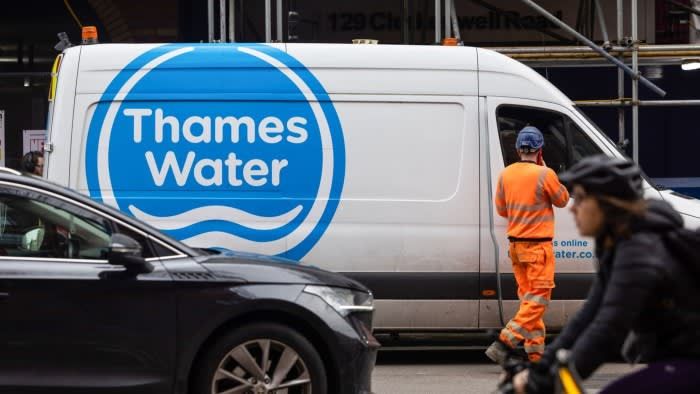Thames Water shareholders signal readiness to take £5bn hit

Gain access to the Editor's Digest at no cost.
Every week, Roula Khalaf, the Editor of the Financial Times, highlights the articles that pique her interest and shares them in this newsletter.

On Thursday, the people who own shares in Thames Water showed that they are willing to lose around £5bn on their investment. They said that they will not give any more money to help the company because it is having problems.
As concerns about the future of Thames Water grow stronger, sources close to the shareholders have revealed that many of them may be considering writing off their entire investment of £5 billion in the UK's largest water company.
The decision was very damaging to the group's aspirations of resolving their financial difficulties. Thames Water requires a substantial amount of money to continue functioning and modernize their aging infrastructure.
On Thursday, a group of nine shareholders consisting of Chinese and Abu Dhabi sovereign wealth funds as well as UK and Canadian pension funds, announced that they would not be investing £500mn of equity into the water company. They deemed the company to be "uninvestable."
According to someone familiar with the ongoing negotiations, it seems very likely that the shareholders have made up their minds. Furthermore, a banker who is closely involved in these discussions stated that there's hardly any possibility of them changing their decision.
The alerts were issued shortly after Thames Water declared that it could potentially convince shareholders to contribute additional funds under certain conditions if Ofwat, the regulatory authority, granted more favorable terms for the company.
The shareholders and Ofwat are at a stalemate about the requirements for adding more money. Shareholders want to be able to raise prices and have less restrictions on sharing profits. However, the public is not happy with the sewage contamination and the performance levels of the privatised utility.
Thames Water is currently facing challenges in servicing its debt which amounts to £18.3 billion. One reason for this difficulty is due to the regulator's actions of restricting dividend payouts.
Kemble, the company that owns it, is expected to pay back a loan of £190 million in the upcoming month.

On Thursday, Kemble notified its lenders that the investors' reversal in providing £500mn in new equity would prevent Kemble from continuing to pay interest and would make it difficult to extend the loan.
The bonds in Kemble significantly dropped to a mere 15% of their original value.
Thames Water's executives have consistently stated that Kemble's difficulties wouldn't affect the regulated utility. However, the company's bonds also saw a decrease in trading activity.
The UK water regulator, Ofwat, has urged Thames Water to explore all avenues for obtaining additional capital to improve the company's performance. However, Ofwat has assured customers that their services will not be impacted. The regulator emphasized the need to attract investment for the water industry while ensuring fairness for customers when it comes to billing.
Possible alternatives to address the issue at Thames Water could entail a debt-for-ownership exchange that would eliminate the current stakeholders, a transition to a distinct form of public administration whereby appointed administrators would pursue fresh investors, or the potential return to government ownership of the enterprise.
The retirement funds USS and Omers, who have invested money on behalf of retirees, have suffered substantial losses on their investments in Thames Water, a utility company.
On Thursday, the USS' largest membership group's union requested the reclamation of Thames Water.
The University College Union, which represents a large number of members in the USS, has expressed worry about the notable financial danger that the scheme poses for its members, as it persists in pouring more funds into unsuccessful investments.
The USS, which holds the second-largest stake in Thames Water, refrained from providing any comments.
Investors had previously promised to contribute £500 million before March and £3 billion before 2030. This would help Thames Water to be financially stable without using public funds.
The promise was made on the condition that Ofwat gives the go-ahead to a fifty-six percent surge in water charges in the next half-decade, while also being understanding when it comes to penalties for not following regulations.
Thames Water attempted to ease the concerns of the general population by stating that talks were ongoing. Chris Weston, who serves as the company's top executive, shared during an interview with Radio 4 that the possibility of special administration was still far off and that it could be avoided if shareholders agreed to supply funds. Thames Water relayed that it currently holds £2.4bn of cash and has access to additional overdrafts, which would enable it to keep functioning until the year 2025.
The corporation declared that it will explore every avenue to acquire fresh funding "from current or brand-new stakeholders".
The Chancellor of the UK, Jeremy Hunt, stated that the Treasury will keep a close eye on the situation at Thames Water. He also mentioned that they believe the company is still financially stable, and the recent news should not affect the quality of services provided to customers.
Thames Water faced a period of chaos in June of last year when its CEO, Sarah Bentley, resigned due to a disagreement with the board regarding the company's restructuring plan. In December, the water company announced that its new permanent CEO would be Chris Weston, who previously served as the leader of British Gas.
The corporation stated that they were still optimistic about reaching an agreement with Ofwat regarding an affordable, achievable, financeable, and attractive business proposal for Thames Water and equity investors. Their goal is to benefit the customers as well.









































